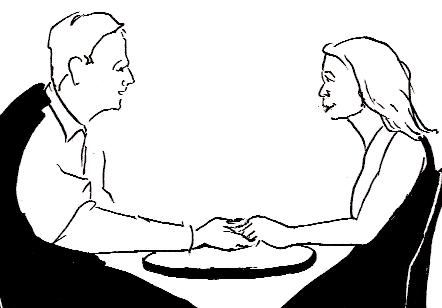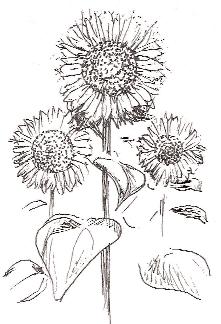
6 minute read
POWERS OF THE SOUL
Intellect -- the ability to think (and come to know the truth)
Will -- the ability to choose freely (to do right or wrong)
Sensation -- the ability to “take in” the environment in an immaterial way
External senses:Internal senses:
- Touch
- Taste
- Smell
- Hearing
- Sight
Sensitive Powers
- Common sense
- Imagination
- Memory
- Estimative / Cogitative sense
Appetition -- the ability to respond internally to what is sensed
Concupiscible Appetite: Irascible Appetite:
- Love
- Desire
- Pleasure / Joy
- Hate
- Aversion
- Pain / Sorrow
- Hope
- Despair
- Courage
- Fear
- Anger
Vegetative Powers
Locomotion - the ability to move oneself from place to place
Nutrition -- the ability to take in nutrients and assimilate them
Growth -- the ability to progress in quantity and in overall life
Reproduction -- the ability to pass on life to another being of the same species
Vegetative Powers
The lowest powers of the human soul -- the vegetative -- are those which it has in common with all living beings -- that is, with plants and animals, too. The vegetative powers govern the most basic processes a being needs in order to maintain its life. These are the activities of nourishing, growing, and reproducing. The vegetative powers of nutrition, growth, and reproduction account for these activities.
With the vegetative power of nutrition, a soul is able to take in the necessary nourishment it needs from its environment. In doing this, it relates with the world around it in a purely material way. For example, the soul of a plant literally draws the nutrients from the soil and the air physically into itself, transforming them into itself. In animals and human beings, the process is similar. The nutrients are taken in physically and changed into the substance of the one being nourished. With this nourishment, the being is able to grow. The vegetative power of reproduction enables the soul/body union to generate a new member of its species.


Vegetative Activities
The vegetative powers of the human soul are not under our direct control. Rather, they are on "automatic pilot," so to speak. They work on their own without our having to think about them. For example, the acids in your stomach break down food without your directing them; the pituitary gland regulates your growth while you are oblivious to its operation; a baby grows and develops in his mother's womb without her controlling the process. This is all probably a very good thing, since these powers are so basic to our well-being. It would be quite an over-whelming task for one to supervise digestion and nourishment, the building up and breaking down of body tissue, the production of sperm and ovum cells, as well as the development of new little human beings!
Someone might object, "But I do have control over my procreative powers and my power to grow and be nourished." Well, it is true
Saint John Paul warns, however, that love which is merely emotional might also superficially absorb shame and thus falsely lead the two to think that they have the right to physical intimacy and to sexual intercourse. This is a mistaken view, he points out, for emotional love is immature love. As such, it cannot truly provide the appropriate context for a true union of persons which physical intimacy and sexual intercourse require.
In fact, Saint John Paul refers to such a superficial absorption of shame as a form of shamelessness. Shamelessness is the lack of shame when and where it should be. With original nakedness, Adam and Eve experiencedthe lack of shame, but they had no need for it. Shamelessness is the opposite of this. When there is a need for shame and a person lacks it, we speak of shamelessness.
Saint John Paul distinguishes between two forms of shamelessness, both of which are the opposite of sexual modesty:
(a) Physical shamelessness -- any way of being or behaving by a person so that sexual value of a person’s body is considered to be more important than the person himself. Such a person is put in a position of being an object of use.
(b) Emotional shamelessness -- the rejection of a healthy tendency to be ashamed of reactions and emotions which make a person merely an object of use because of the sexual value of his body.23
The Role of Chastity
From all that we have come to understand thus far about love, we are able to realize now that genuine love of another person -- especially a person of the opposite sex -- requires a giving of oneself and a willingness to sacrifice. Love makes demands, and sometimes entails a struggle.
We cannot allow love to remain merely at the subjective level -that is, at the sensual or emotional levels. Nor can love remain an experience of only one of the two persons involved. Rather, mature human love requires that the various elements of love -- the sensual, the emotional, and the volitional -- be integrated within each of the persons and that it be shared between them so that they form a personal and interpersonal whole.
Without this integration, love will not rise to the level appropriate for human persons, and thus it cannot truly unite them. With this integration, however, that is, with the involvement of the intellect, will, and emotions working together, the love is based firmly on an acknowl-
“True shame can be absorbed only by true love, a love which affirms the value of the person and seeks the greatest good for that person with all its strength.”
St. John Paul II Love and Responsibility
Shamelessness -- the lack of shame when there is a need for it; at odds with the demands of sexual modesty.
“...Sexual modesty is not a flight from love, but on the contrary the opening of a way towards it.”
St. John Paul II Love and Responsibility
“Genuine love ... is demanding; but its beauty lies precisely in the demands it makes. These demands are ... capable of making your love a true love.”
St. John Paul II edgement of the value of the person. On this firm foundation, the lover can foster within himself a whole-hearted desire for the beloved's good.
Integrate -- from Latin integrare (to restore); to bring together into a whole.
Chastity -- from Latin castus (clean, pure); the virtue by which a person affirms the true meaning and value of human sexuality.
“The essence of chastity consists in quickness to affirm the value of the person in every situation, and in raising to the personal level all reactions to the value of ‘the body and sex’.”
St. John Paul II Love and Responsibility
This is the reason for the importance of the virtue of chastity. The word "chaste" means "clean" or “pure.” Chastity, then, is the virtue (good habit) that frees us from anything that would mar the pure goodness of human sexuality. Chastity disposes or inclines us to use our sexuality in a reasonable way, that is, in a way that respects the true value of the person. The chaste person is the one who affirms the true meaning and value of human sexuality as a great good given to us by the Creator.
Simply put, chastity is the virtue which makes it possible to use the gift of sexuality in a rightly ordered way. It requires that one engage in the act of sexual intercourse only with one’s own spouse, as an expression of loving spousal commitment. Chastity necessarily also means that one avoids any actions, thoughts or situations which could in any way endanger chaste living.
“Chastity is love preparing to give itself ....”
Paul M. Quay
“Chastity includes an apprenticeship in self-mastery, which is a training in human freedom. ... Either man governs his passions and finds peace, or he lets himself be dominated by them and becomes unhappy.”
Catechism of the Catholic Church, #2339
To be chaste is to value the person as someone to be loved, not as a body to be used.
To be chaste is to love the person for who he or she is, not to use him or her for what pleasure we can receive.
To be chaste is to consider the person more valuable than sexual pleasure.
To be chaste is to possess the good habit (virtue) of using our sexual powers in a truthful and humanly fulfilling way.
Chastity is challenging, often difficult, and even counter-cultural -- but it is a beautifully human virtue, and it brings freedom. Chastity frees us from:
sexual idolatry,
being slaves to our passions,
using and abusing human persons. Chastity frees us for:
self-mastery of our passions,
becoming truly loving human persons,
worshiping God through the right use of our bodies.




